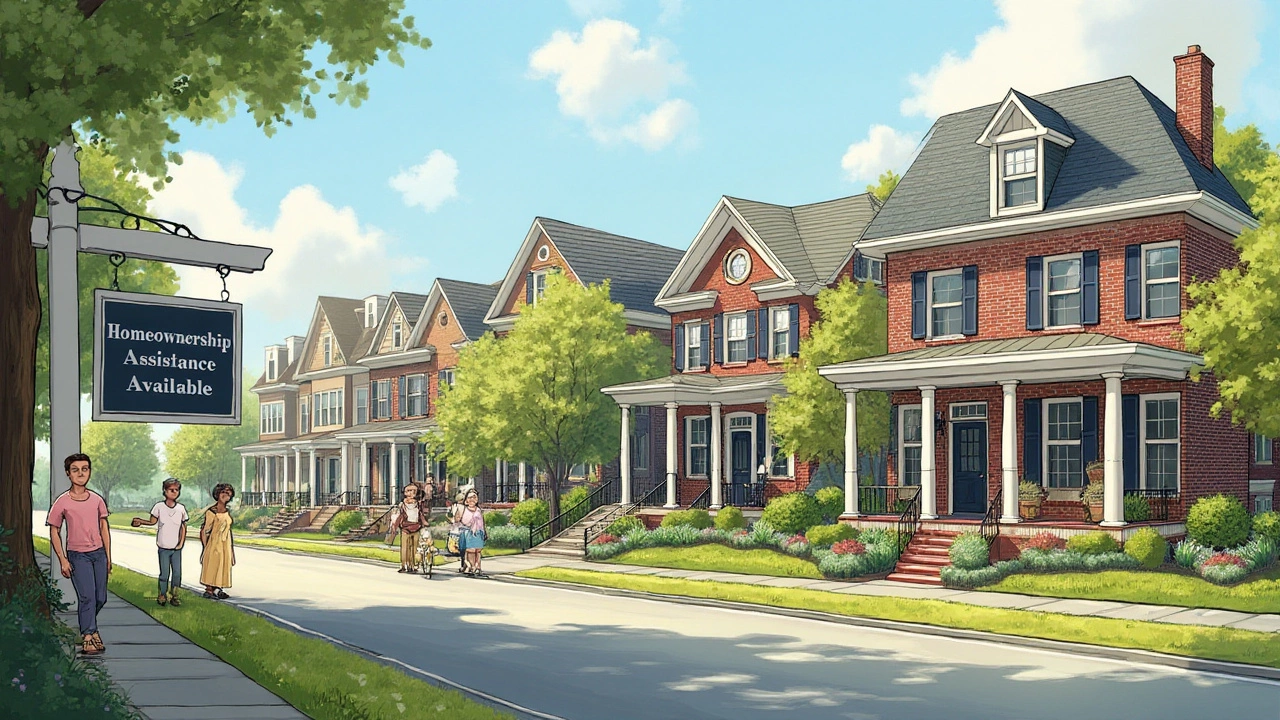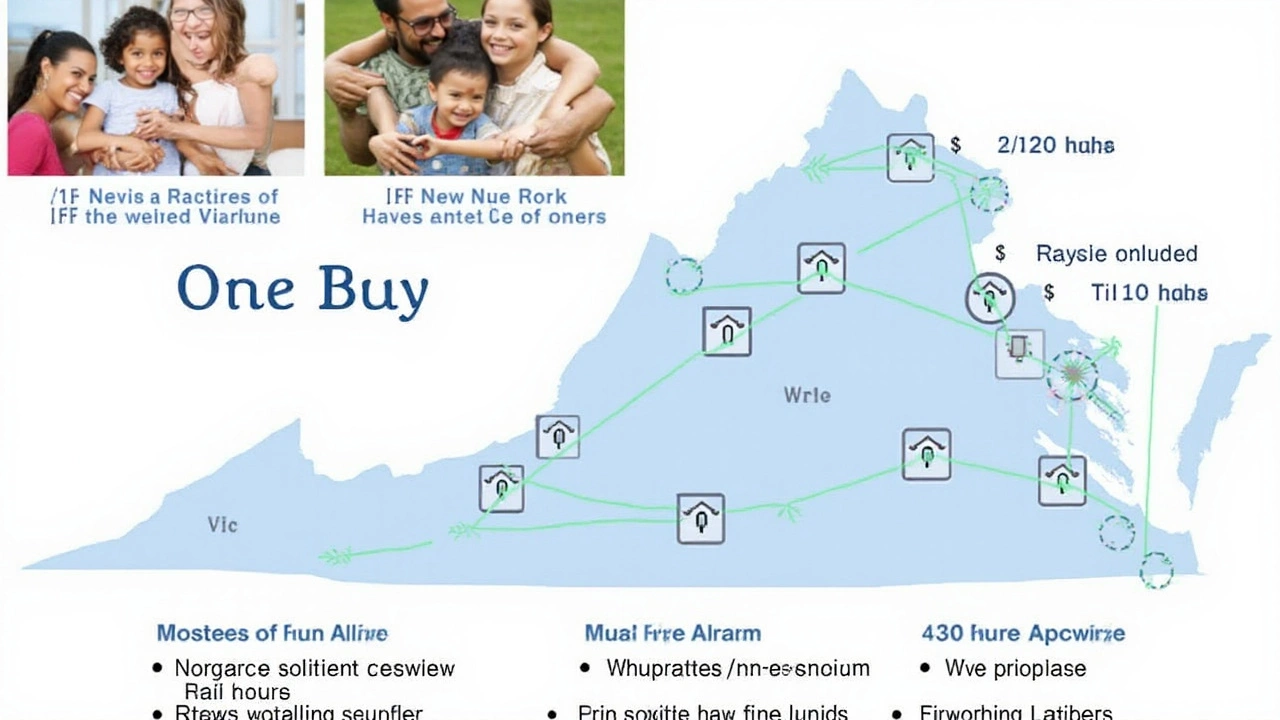Virginia stands out as a supportive state for first-time homebuyers, offering a variety of down payment assistance programs designed to ease the financial strain of entering the property market. These initiatives play a pivotal role in helping potential homeowners to bridge the gap between their available funds and the required down payment, thus turning the dream of owning a home into a reality for many.
The state has established several programs, each with unique offerings and eligibility criteria meant to assist individuals at different income levels and backgrounds. Whether you're looking for grants or loans with favorable terms, understanding these options is crucial to making the most informed decision. Moreover, knowing the ins and outs of these programs can save you time and money as you embark on your home buying journey.
In this guide, we’ll delve into the specifics of what these programs entail, highlight the main requirements for applicants, and share some valuable tips to help you navigate the process smoothly. By taking advantage of these resources, you can significantly lower the financial barriers associated with buying your first home in Virginia.
- Understanding Virginia's Down Payment Assistance Programs
- Key Programs and Their Offerings
- Eligibility Criteria and Application Process
- Tips for First-Time Homebuyers in Virginia
Understanding Virginia's Down Payment Assistance Programs
When exploring homeownership in Virginia, many first-time buyers often find themselves overwhelmed by the looming hurdle of the down payment. Enter Virginia's suite of down payment assistance programs, specially crafted to demystify and diminish this challenge. These programs act as a financial buffer, designed to aid aspiring homeowners across the state by providing both advice and monetary support. Whether through grants or low-interest loans, such options are tailored to add a layer of financial ease to the process.
A key player in Virginia's housing ecosystem is the Virginia Housing Development Authority (VHDA). It spearheads various initiatives aimed at making homes accessible to everyone. The programs range from outright grants to forgivable loans, each with specific criteria designed to target those in most need of assistance. While the complexity of these programs may initially seem daunting, a closer examination reveals a structured pathway to potential homeownership. For example, the VHDA’s Down Payment Assistance Grant offers up to 2.5% of the property's purchase price, ensuring that the steep upfront costs don't bar individuals from their dream homes.
Eligibility often extends to include an array of applicants, such as first-time buyers and veterans. However, these programs require applicants to complete an educational course, which plays a dual role. It serves both as an eligibility criterion and as a valuable resource, equipping buyers with crucial knowledge about the homebuying journey. This requirement reflects a commitment to sensible homeownership, ensuring buyers are well informed about the responsibilities and processes involved. The intention is to prepare those entering the market to manage their financial responsibilities effectively.
The National Association of Realtors once noted, "In today's ever-changing housing market, education is as important as the financial resources we provide."
A unique aspect of Virginia's approach is its inclusivity. Programs are designed to cater to varied incomes and social groups, demonstrating an understanding that home ownership is not a one-size-fits-all scenario. By providing flexible financial solutions and educational support, these programs create a supportive framework for a diverse range of potential homeowners.
Moreover, many localities have devised specialized assistance programs, complementing state-wide initiatives. This ensures there's a localized touch to the assistance provided, aligning with the specific economic realities of different areas. For instance, some urban centers offer targeted help focusing on revitalizing certain neighborhoods, thus enriching the community fabric by fostering homeownership in areas that could benefit most from fresh investment.
To get started, potential buyers should begin by gathering information and attending a free homebuyer education class, which lays the foundation for understanding the complete set of available resources. With determination and the right tools, traversing the path from dreaming of owning a home to actually holding the keys can become a tangible reality for many first-time buyers embracing these supportive measures in Virginia.

Key Programs and Their Offerings
Virginia offers several robust down payment assistance programs aimed at helping first-time buyers get a foothold in the real estate market. A flagship initiative is the Virginia Housing Development Authority's (VHDA) Down Payment Assistance Grant. This program is instrumental in easing the burden of upfront costs by providing a percentage of the home's purchase price as a grant. Essentially, this means you could receive a financial boost that doesn't need to be repaid, making it a highly attractive option for many aspiring homeowners.
Another significant program is the Community Homeownership Revitalization Program (CHRP), which is specifically designed for those looking to purchase in targeted revitalization areas. These initiatives not only provide financial assistance but also encourage the rejuvenation of communities, leading to an improved local economy and enhanced property values. Participants can benefit from favorable interest rates and other incentives that make the purchase more affordable and investable.
The USDA's Rural Development Loan Program also plays a vital role in Virginia real estate, offering assistance to eligible rural homebuyers. This program is unique because it doesn't necessitate a down payment at all, provided the home is located in an eligible rural area. For many, this could mean the difference between renting and owning in picturesque countryside locales, offering serenity and space at an affordable price point. Given Virginia's diverse landscape, this opens up numerous opportunities for new homeowners to find their ideal setting without the stress of a hefty upfront cost.
For veterans, the Virginia Department of Veterans Services offers a range of assistance options. These include the Virginia Veterans Housing Assistance Program, which provides exclusive benefits to those who have served. Veterans can enjoy reduced rates for their home loans and potentially access additional funds to cover the initial costs of home buying. This is a token of appreciation for their service and a practical way to ease their transition into civilian life.
"Access to homeownership is a cornerstone of building a stable, productive life. Programs like these ensure that more Virginians have an opportunity to establish roots, build equity, and thrive within their communities," remarked Jane Henderson, a noted expert on housing policy.
It's also important to mention the diversity of options under the Fannie Mae and Freddie Mac programs. Their HomeReady and Home Possible programs are tailored for low to moderate-income buyers, offering reduced down payment options as low as three percent. These national programs have a regional impact, encouraging more inclusive access to homeownership by addressing equity and affordability issues prominently across Virginia. This variety of programs underscores the state's commitment to nurturing a vibrant housing market where first-time buyers can find their footing with ease.

Eligibility Criteria and Application Process
Virginia's commitment to helping first-time homebuyers realize their dreams is evident in the structured eligibility criteria designed to ensure assistance reaches those who genuinely need it. The eligibility criteria often include income limits that vary based on household size and geographic area, which ensures fair access to these programs across varied socio-economic demographics. Typically, applicants must not have owned a home in the past three years to qualify as a first-time homebuyer. However, exceptions may be made for those who are single parents or displaced homemakers. It's vital to verify the specific requirements for each program as they can differ significantly.
The process starts with gathering your financial documents, including recent tax returns, pay stubs, and bank statements. These documents are integral in assessing your financial health and eligibility for different programs. While navigating the County Reinvestment Act zones in urban versus rural settings, applicants may find additional incentives, complicating the application process. Therefore, consulting with housing counselors could be a wise step to ensure all criteria are clearly understood and met. Many find that working with a professional provides invaluable insights into maximizing potential benefits from these programs.
Next, you will fill out applications specific to the chosen program. The application process can be rigorous and might require participation in homebuyer education sessions, ensuring you’re well-prepared for the responsibilities of homeownership. Completing these sessions often enhances application approval odds as they demonstrate your commitment and understanding of long-term financial obligations. Always double-check submission deadlines, as these can affect your application's consideration.
"Proper preparation and understanding of your financial picture can make a world of difference when applying for these programs," advises a senior housing advisor at the Virginia Housing Development Authority.
Moreover, many programs operate on a first-come, first-serve basis, making it important to submit your application promptly as funding can be limited. Depending on the response time, it’s essential to follow up on your application status to adjust your plans accordingly. Rejections due to technicalities can often be appealed if minor mistakes are addressed swiftly, showcasing the importance of attention to detail during this phase. For ongoing assistance, it is generally advised to remain in touch with regional housing offices to remain aware of any shifts in program offerings or criteria adjustments.

Tips for First-Time Homebuyers in Virginia
Embarking on the journey to buy your first home in Virginia can be both exhilarating and daunting. With a myriad of options and considerations, a few guidelines can go a long way in simplifying the process. Start by attending a first-time homebuyer workshop. These are often offered by local housing non-profits and can provide invaluable insights into the home buying process, as well as help you understand the various down payment assistance programs available specifically in Virginia.
Next, it’s crucial to get pre-approved for a mortgage. It not only gives you a clear idea of what you can afford but also strengthens your negotiating position with sellers. While many brands and banks offer pre-approval, Virginia’s VHDA (Virginia Housing Development Authority) provides resources tailored to newcomers in the real estate market. Their pre-approval process might even align you with further assistance opportunities.
Be savvy with your finances by ensuring you have a good credit score and that you understand the associated costs beyond just the mortgage. Closing costs, inspection fees, and insurance can add up quickly, so keeping tabs on them helps prevent surprises. Additionally, consider your long-term plans; are you purchasing in an area that supports your future goals, like career opportunities or family plans? Virginia offers a plethora of regions each with unique advantages, so evaluating them based on personal plans is wise.
Understanding the local real estate market in Virginia is key. While prices across the state have seen steady increments, certain areas still offer affordable choices. Suburban areas around major cities like Richmond or Norfolk might offer the ideal balance between cost and convenience. According to the Virginia REALTORS® Association, the median home price in the state increased by 4.3% in the last year, showing a thriving market but emphasizing the importance of timing your purchase.
Another vital tip is to engage a knowledgeable real estate agent familiar with Virginia's specific housing landscape. A local agent can guide you not only through the intricacies of the process but also provide insider knowledge about neighborhoods and potential future developments. They can also help identify homes that qualify for down payment assistance and are well-versed in negotiating these benefits effectively.
A recent survey by the National Association of Realtors found that 87% of buyers purchased their homes through a real estate agent or broker—a record high, underscoring the value of professional guidance.
Lastly, look into the government-backed loan programs, such as FHA loans, which are popular among first-time homebuyers due to their lower down payment requirements. Combining these with state-specific assistance can significantly reduce upfront costs. Keep an eye out for programs that offer both grants and loans; these can combine to cover a greater portion of your initial expenses, leaving more in your pocket to furnish and settle into your new home.


Corbin Fairweather
I am an expert in real estate focusing on property sales and rentals. I enjoy writing about the latest trends in the real estate market and sharing insights on how to make successful property investments. My passion lies in helping clients find their dream homes and navigating the complexities of real estate transactions. In my free time, I enjoy hiking and capturing the beauty of landscapes through photography.
view all postsWrite a comment